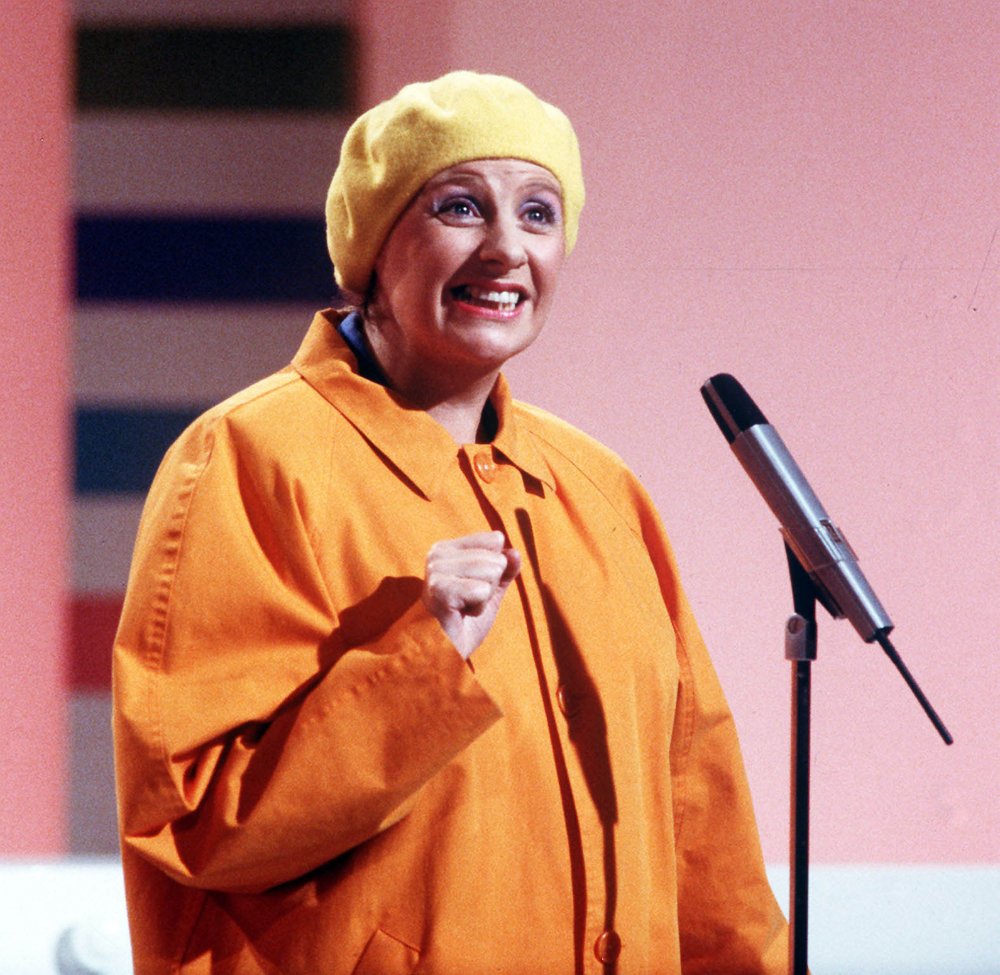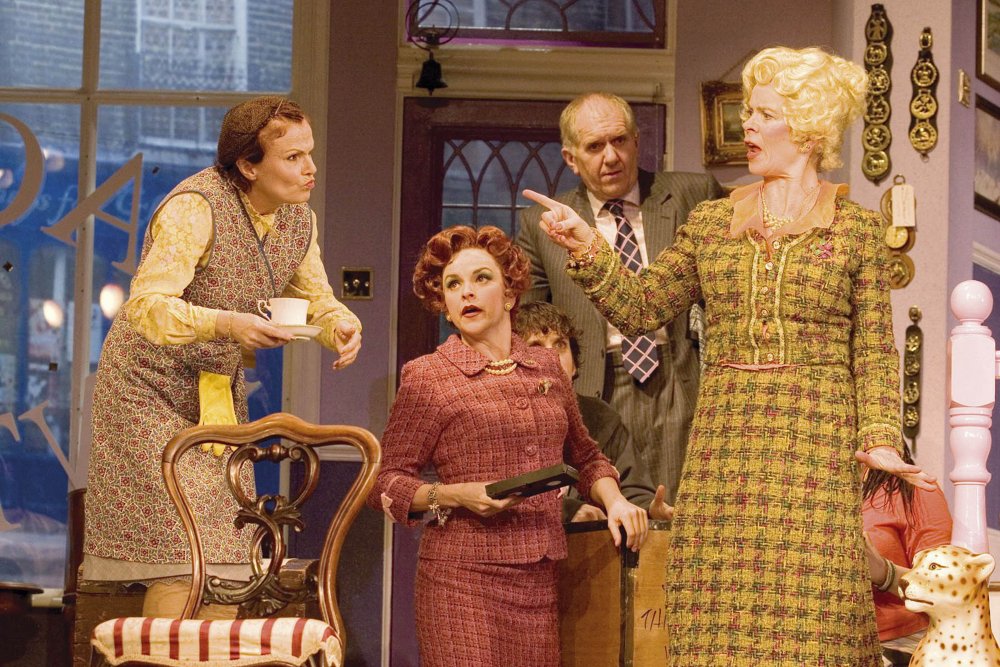Web exclusive

Victoria Wood in What Did ITV Do For Me? (2005)
If you grew up in the 70s or 80s you will know that Victoria Wood’s comedy spoke to a particular kind of Englishness that was once achingly familiar, but which no longer exists. Hers was an England of dessert trolleys and tepid tea, of Clarks shoe shops and limp sandwiches eaten on the hard shoulder of a B road. It was a nation defined by low expectations, in which Freda dreams of romance but settles for occasional sex in her nightie. When I heard about Wood’s death I was in California, and I sat in the sunshine and cried. Nobody in America knew who she was. I’d never felt so homesick.
You’ve probably never met a British person who doesn’t like Victoria Wood. It was almost physically impossible not to like her. In a country defined by class she made those barriers irrelevant and scooped us all up in her huge comedic embrace, a mother to us all. She was in our homes every Christmas and the rest of the year she was there too, as we watched her over and over again on worn-out VHSs, trying to learn by heart the routines that tickled us so much, to inhale those musical rhythms that were all her and couldn’t have come from anyone else. Now they are part of our collective DNA. Barry and Freda are as familiar as Coronation Street. She had become part of our national furniture, and like a favourite armchair, we thought she’d be around forever. There’d always be another Christmas special, another Housewife 49. Now that she’s gone, the future looks bleaker.
A Northern comedian beloved just as much by the South, Wood was nonetheless fastidious in her dissection of class, wealth inequality and snobbery. Think of Patricia Routledge as Kitty (“My maisonette backs on to a cake factory, so I’m dusting my knick-knacks the whole day long…”) and then think of Dinner Ladies, Wood’s underrated sitcom set in the canteen of a factory in Manchester (“Counselling! My mother was trapped under a Blackpool tram for four and a half hours – she didn’t get counselling. She got a cup of tea and two tickets to Charlie Drake!”).
Who but the British can begin to understand the complex weight of subtext in those lines? How to explain the subtle difference between a house and a maisonette? Or the specific cultural resonance of Charlie Drake? She didn’t just write what she knew, she wrote the whole country. She understood what it means to be British better than anybody else: the cautiously-expressed ambitions, the awkward social interactions and, most of all, the small sadnesses that define us. Every time I watch Swim the Channel [►] I have to fight back tears as I laugh. Which other comedian would send a teenage girl off into the English Channel, never to return? There are shades of Samuel Beckett and Chris Morris there, if you look hard enough. There’s even a trace of Morrissey in those elegiac, bittersweet English folk ballads of hers. If you do one thing this week, make it listening to Like Any Old Day, a deft song about love and death which has always been sad, but is now doubly so.
Wood herself talked publicly but quietly about her own depression (her Desert Island Discs is lovely) and her characters always keep the melancholy at bay with small consolations. A teacake, maybe, or a trip up town on the bus. There’s never time for histrionics. Like Wood herself, her characters just get on with it. “If they like you in the North of England they won’t say, ‘You were wonderful, darling!’ They’ll say, ‘You weren’t bad’ or ‘I didn’t mind it.’ I hope Victoria Wood knew how not bad she was, and how much we all didn’t mind her.
Wood found fame in 1974 on ITV’s New Faces, and was always an uncomfortable fit on a comedy circuit that also made space for Bernard Manning and Benny Hill. Unlike many of her contemporaries, she was neither a sexist nor a racist. Nor was she overtly political. But I think of her as a kind of Trojan Horse of radicalism – quietly changing the world with a smile. Before you knew it she was in your living room, first of all making you laugh, then making you feel differently about people – ushering in a kinder, more empathetic world in which a character’s flaws make them more loveable, not less.
Always truthful, never cruel: who else can make you feel sympathy for the public-school girl in Just an Ordinary School who answers the question “What do you think of working-class girls?” by nodding assuredly and saying “Well, I think there have to be some”? No one in Wood’s landscape of characters sees themselves clearly or understands what they really are. But Wood saw all of us.
From an early age she chose to hover on the sidelines, observing but not participating. Speaking about her childhood on Desert Island Discs, she described an atomised family life lived almost entirely alone in her bedroom, where she would eat, play the piano, watch television and read. “I couldn’t really bear to be conscious without a book,” she said.
Growing up watching her, it never occurred to me that she was what people still like to call a ‘female comedian’. She was just that funny person I loved so much on the telly. Now, having worked in television comedy for many years myself, I realise how extraordinary her achievement was. The team she assembled for the BAFTA-winning As Seen on TV was an actual monstrous regiment: it comprised Wood herself, Routledge, Julie Walters, Celia Imrie, Susie Blake and token man Duncan Preston. How many sketch shows has the BBC broadcast since with that ratio of women to men? I can’t think of any.

Julie Walters, Josie Lawrence, Duncan Preston and Celia Imrie in Acorn Antiques: The Musical! (2005)
And what magic it is to see all those women pass the comedy baton back and forth between them with such generosity. One minute Wood is the daft, clownish waitress asking the same question (“Is it on the trolley?”) ad nauseam; the next she’s happy to play the straight man so Walters can rip the heels off a pair of shoes to make them unceremoniously into flats. There’s something egoless about that – she always wrote her best jokes for other people. Which other writer-performer would be mad enough to give Two Soups to someone else?
Seeing her live with my mother at the Royal Albert Hall in the early 90s (one of the few activities which, as child and adult, we could both genuinely enjoy together) the thing I remember most was how she would beam delightedly at the end of every joke, as the room fell about laughing with her. She loves us too, I remember feeling, just as much as we love her. We will miss her very much.
-
The Digital Edition and Archive quick link
Log in here to your digital edition and archive subscription, take a look at the packages on offer and buy a subscription.




